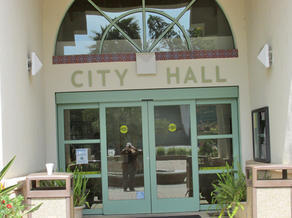Possibilities include short term rental tax and sales tax
increases
The council this week directed staff to come back with information about the impact of increasing the transient occupancy (short term rental) tax. The staff will research the issue and come back to a council meeting. A sales tax increase may also be considered.
Avalon has nearly exhausted its reserves, according to City Manager Denise Radde’s staff report to the Feb. 2 council meeting. With that in mind, staff presented the council with options for increasing Avalon’s revenues.
The City Council’s direction followed a discussion of Avalon’s options, which include possible sales tax and transient occupancy tax increases to raise revenue. In the near future, the council will decide whether to put the tax question on a ballot for voter approval.
The city could call a special election in November.
City Attorney Scott Campbell said that tax increases put on the ballot by the council would have to be approved by 66% of the voters.
He said if the ballot measure came from the citizens, it would require vote of 50% plus one to pass.
The council also briefly discussed reducing the local Chamber’s percentage of the city’s short transient occupancy (short term rental) tax. The business group, officially known as Love Catalina, currently gets 22% of the money collected for the city’s TOT.
City Attorney Scott Campbell said that a change in the Chamber’s percentage would have to go to the voters. The council could not change it.
Options
During the discussion, Radde reminded the council that Finance Director Matthew Baker has said it would be a minimum of five years before Avalon recovers from the financial impact of the pandemic.
In her staff report, Radde provided the council members with the available options:
• Increase the transient occupancy (short term rental) tax by 1% for a decade.
• Increase the sales tax by 0.25%.
The city manager encouraged the council to look at those increases.
• Change the percentage of the transient occupancy tax that the city distributes to Love Catalina/Catalina Island Tourism Authority. The non-profit organization gets 22% of the TOT collected.
In related news: “The Tourism Authority is currently exploring development of a Tourism Business Improvement District (TBID),” Radde wrote.
“If approved by the City Council, the TBID may implement an independent fee assessed to some or all businesses as a funding source,” Radde wrote.
The council did not discuss changing the Love Catalina/Tourism Authority’s percentage this week.
(When the idea has been discussed in the past, the non-profit has resisted.)
Transient
occupancy tax
The current TOT is 12%. Staff proposed increasing it to 13%.
“That 1% would stay in the city’s coffers, it would not be split with the Chamber,” Radde told the council.
Staff recommended that the money from the proposed tax increase be reserved for the city government.
“My comment on TOT is that it is not a tax paid by the locals,” said Councilmember Michael Ponce.
“It’s paid by the visitors,” he said.
He asked how many of the council members book a hotel in a city based on the TOT.
According to Ponce, a lot of people book a hotel and find that the hotel has a resort fee and a Wi-Fi fee—and Avalon doesn’t have those fees.
Ponce asked if the proposal could be written so the proposed increase is for a period of 10 years or when the city is financially whole again.
Radde said the city would want to have money in reserve for another emergency situation.
City Attorney Campbell said a “triggering event” for ending a tax would have to be precisely written.
Lavell proposed increasing the TOT to 14% and let the Chamber receive its current percentage from the entire TOT. “I think that 14% is reasonable,” Lavell said.
Councilmember Cinde MacGugan-Cassidy said she was not opposed to putting a TOT increase out to the voters.
Ponce agreed with going to a 14% TOT.
Cassidy said she did not like the idea of figuring out which 1 or 2% goes to the city. She opposed a more complex accounting process for allocating the portion of the TOT that goes to Love Catalina.
Sales tax
Mayor Anni Marshall said a 0.25% sales tax increase would be the simplest option.
Councilmember Lisa Lavelle said the percentage “would literally be a quarter on a $100 bill.”
Avalon’s current sales tax is 10%, according to Radde’s staff report.
“There are approximately 21 cities in Los Angeles County that have a combined sales tax greater than 10 percent, including Long Beach, Santa Monica, and Compton,” Radde wrote.
Local voters rejected a quarter-of-a-cent sales tax increase in March 2020.
That, however, was before the pandemic and the severe blow to the economy caused by travel restrictions.
“If directed by the City Council, a Special Election may be held as early as November 2, 2021,” Radde wrote.











